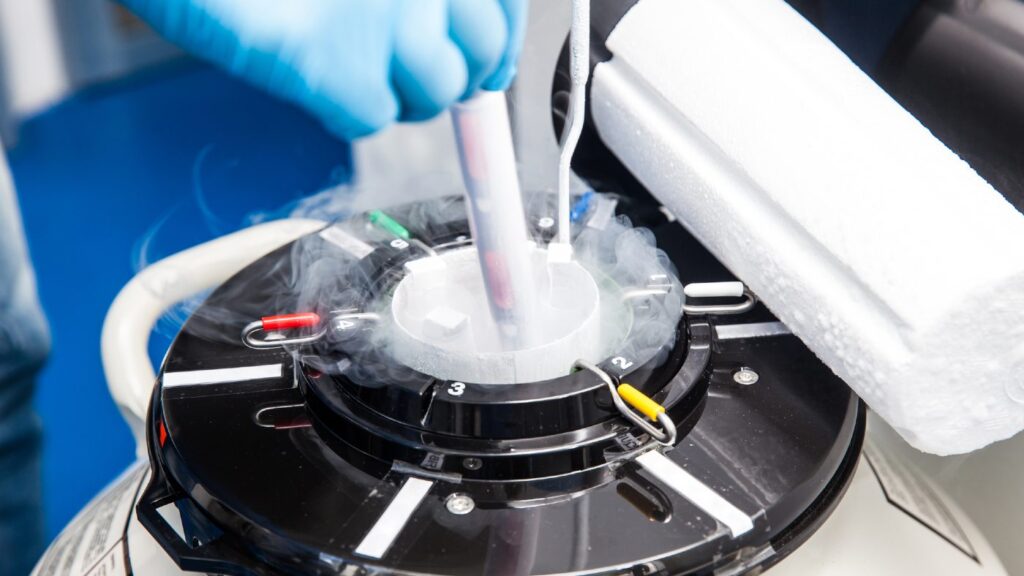Table of Contents
- 1 Cryo shipping in Europe – general information
- 2 Cryo shipping – legal issues and availability
- 3 The process and timeline of shipping oocytes, sperm, or embryos
- 4 The risks of shipping cryopreserved material
- 5 Cryo shipping costs
- 6 Cryo shipping – success stories – patients real stories
- 7 Cryo shipping – FAQ
- 7.1 How much time is needed for cryo transportation? How long does it take to transport the frozen material?
- 7.2 How much frozen material can fit inside one container?
- 7.3 Can I ship internationally?
- 7.4 Can I get insurance on the genetic material that is being shipped?
- 7.5 Should I be present in the clinic during the pickup of delivery?
- 7.6 Can embryos, sperm, or oocytes be all shipped inside one container?
- 7.7 Can infected biological material (HIV, hepatitis infected) be shipped?
- 7.8 Who should choose the shipping company: myself or my doctor?
Cryo shipping in Europe – general information
Cryoshipping is the transportation of various frozen biomaterials, e.g. those used in IVF (embryos, sperm, oocytes), pharma, or biomaterials of animal origin in a special medical container – dewar.
You simply cannot have a successful cryo shipment without the correct containers. The only way to transport cryopreserved IVF samples is to use medical containers that are called dewars, or dry shippers. These containers adhere to the regulations of the EU-Tissue Directives 2004/23/EC, 2006/1EC, and 2006/86/EC.
What are these containers for? Biomaterials must be transported at a special temperature (-196 °C) in native nitrogen so that they do not thaw and lose their qualities. Only an embryologist can properly thaw the biomaterial for further successful fertilization. How are the containers filled in? The courier takes a pre-chilled dewar and hands it to the embryologist who is responsible for putting the frozen biomaterial into the dewar. It is important to follow the general recommendations for packaging, namely:
- a small container holds up to 3 goblets or holders, that is 7 straws in a vial on 1 goblet,
- the maximum number in a small container is 21 straws,
- a large hole can hold 12 holders – 24 goblets – up to 84 straws. In 1 straw from 1 to 3 oocytes, for example.
- it is recommended to carry it in one-level packing.
Patients use cryo shipping services because their donor materials are in a different country to where they are being treated. The documents needed for shipping must be translated in accordance with all requirements and permits. Patients need to pay for cryo shipping out of their pocket. It is standard practice that all the documents and permits needed are dealt with by the cryo shipping company and are in accordance with the laws of your country.
Also, to learn more about IVF sample transportation, you can watch the videos with cryoshippping questions and answers.
Cryo shipping – legal issues and availability
Some countries have a special government body that monitors and approves all IVF-related transportations (sperm, oocytes, embryos) internationally. These are Anvisa in Brazil, HFEA in Great Britain, FDA in the USA and Canada, etc.
- The European Union Tissue and Cells Directives – EUTCD – the European Directive which describes the processes related to reproductive medicine within the EU, in particular, this Directive also describes the conditions for import and export of IVF samples from other non-EU countries. It should also be noted that each EU country may have additional local laws concerning samples transportation for artificial insemination.
- HFEA (Human Fertilization and Embryology Authority) regulations are applied in Great Britain. They are very similar to EUTCD but the regulations and responsibility for their compliance are applicable to the UK clinics.
- FDA (Food and Drug Administration) – Food and Drug Administration describes regulations and requirements, including for clinics in the United States, which receive samples of materials from other countries.
- ICAO and IATA – organizations that describe transport regulations and requirements for biomaterials on board aircraft.
Some clinics in European Union countries do not allow shipping outside the EU directly, though, few courier companies found a legal way to avoid this measure. If the samples are shipped from abroad, the customs office should be provided with invoices that describe the quantity of material that is being shipped, the characteristics of the equipment in which it travels. the sender and consignee details, export/import dates, and transport route which is being used. Based on these invoices, together with the international cooperation agreement and the data of the forwarder (i.e. courier), customs pre-clearance is done a few days before the trip, sometimes depending on the country, an electronic declaration is required. At ARK Cryo, they are working with each personal request for transportation and provide all the necessary information and documents in the language that is convenient for patients and for the destination country.

The process and timeline of shipping oocytes, sperm, or embryos
A patient finds a courier company with the best reputation on the market, contacts them, and provides information about the desired amount of material to be shipped, the pick-up and delivery address, and timeframe. If you are one of the countless international patients who has decided to have the entire fertility treatment abroad, you need to choose a reliable transportation company. It is important that you find a company that can expertly handle your frozen transportation and fulfills your cryo delivery needs.
After you make a choice, the chosen shipping company sends you a quote. If you accept it, you will receive a package with documents you and the clinic should fill in to start the process (the documents include an agreement for transportation, transfer act, import/export consents, etc). After the documents are ready, time and date are settled with both releasing/receiving institutions and a courier sets off with the container and the documents, and the delivery is made within 24-72 hours as a rule. After completed delivery, the courier sends a notification to the customer, including photo evidence if possible. Some shipping companies (few of them, actually) offer an insurance policy package for frozen biomaterials. Therefore, in case the shipment is damaged during transit there is a chance to get reimbursement. However, such cases are rare, as this kind of shipping using a personal courier has the highest safety level and can be trusted.
Remember! Standard transportation companies (such as Fedex and DHL) cannot guarantee that your cryomaterials will not be X-rayed. For this reason alone, it is important that you use the services of specialised cryoshipping companies. They understand the particularities of the business and they accompany the container that holds your cryomaterials throughout the entire trip. They know how to communicate with the IVF clinic staff and patients, as well as with airport security control.
The risks of shipping cryopreserved material
In IVF shipping, a responsible courier, and a properly maintained dry shipper are the keys to safe transportation. To ensure that the conditions including temperature, time in transit are perfectly set up for smooth delivery, only dry shipping containers (dewars) that have been approved by the International Air transport Association (IATA) should be used during such transportation process.
The dry shipper’s inner temperature is measured throughout the transport in regular intervals by a data logger to ensure that samples are never exposed to higher temperatures and to also ensure the stability of the inner environment. The environmental stability of a dewar is constantly tested and the data loggers are serviced to minimize any potential issues. The container is kept upright at all times during transportation.
It is always a good idea to speak with your cryo shipment company about their guarantee policy. Most cryo companies (including ARK Cryo) are proud to offer a full 100% transportation survival rate guarantee, or you are entitled to receive your money back in full. So if you want to guarantee your trip, you can just ask for the Guarantee Program.

Cryo shipping costs
When choosing a courier company, you should remember that the price is calculated according to three main criteria listed below:
- what equipment is best suited under the given quantity of biological material requiring transportation?
- the complexity of the route (time needed, the distance),
- the administrative charges (customs duty, additional travel costs for the courier).
These three main factors determine the cost and in conjunction with the margin of the company’s services will form the selling price for the customer. Below you can find some examples of costs that have been quoted to patients by cryo shippers:
- Europe – Europe, €1,600-2,300 – 2-4 days
- Europe – Asia, €2,600-3,600 –2-6 days
- Europe – the USA, €2,700 -3,600 – 2-6 days
- Europe – Canada, €2,700-3,600 – 2-6 days
- Europe – South America, €3,200-5,500 – 2- 6 days
- Europe – Africa, €3,200-4,000 – 2-6 days
- Europe – Australia, €3,200-4,500 – 4-10 days.
Cryo shipping – success stories – patients real stories
Patient shipping her embryos from Spain to Ukraine
The patient had her embryos stored in Spain and wanted to ship 8 of them to Ukraine. She contacted one of the courier companies in Eastern Europe, to organize the transportation for her. The cost was €2,200. Although shipping directly from Spain to Ukraine is not possible in some cases, due to complicated IVF law in Spain, the shipping company managed to do it legally, through a different clinic in the EU.
LGBT+ couple – sperm transportation from the USA
An LGBT+ couple wished to transport their sperm sample from the USA to Ukraine, where they had found a perfect oocyte donor and wanted to create embryos for the surrogate mother. The whole process took about 4 weeks from the start to the delivery date and cost approx. USD3,200.
Single woman – embryo transportation
A single lady was planning to have IVF with her embryos in a different clinic because of the high cost of the program, so she contacted a courier company who helped her with shipping from a clinic in Germany to a clinic in Kenya, where she successfully got pregnant.
Cryo shipping – FAQ
Patients frequently ask about shipping biological material abroad. Have a look at the answers to the most often asked questions about cryo shipping.
How much time is needed for cryo transportation? How long does it take to transport the frozen material?
It usually takes from 24 hours to 3-6 days of transit (transit time depends on how far you need to make the delivery), including 1-3 weeks of preparation of the documents before the courier leaves.
How much frozen material can fit inside one container?
A container can fit up to 9 vials or 21 straws for the small hand-carry containers.
Can I ship internationally?
Yes, certainly. Most of the cryo shipping companies provide both domestic and international shipping services.
Can I get insurance on the genetic material that is being shipped?
Yes, several cryo shipping companies provide insurance policies for IVF shipping.
Should I be present in the clinic during the pickup of delivery?
Cryo shipping companies do not have that requirement, but some clinics in some cases would ask you to be present at that moment.
Can embryos, sperm, or oocytes be all shipped inside one container?
Yes, if all the frozen samples can fit in one container, they can be shipped together.
Can infected biological material (HIV, hepatitis infected) be shipped?
Yes, it can be shipped, however, only using a special dewar and separately from other patients’ frozen material.
Who should choose the shipping company: myself or my doctor?
The decision to choose the shipping company belongs entirely to the patient. Patients can choose a company that they find the most trustworthy and reliable.
*This post has been written in cooperation with ARK Cryo, an international transporting company.





